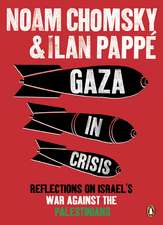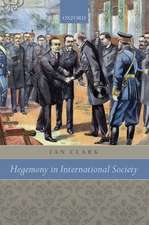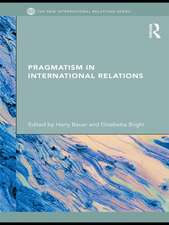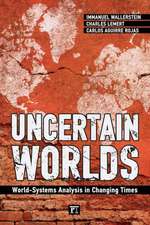Elusive Peace: Negotiating an End to Civil Wars
Editat de I. William Zartmanen Limba Engleză Paperback – aug 1995
As the threat of superpower confrontation diminishes in the post-cold war era, civil wars and their regional ramifications are emerging as the primary challenge to international peace and security. Notoriously difficult to resolve, these internal conflicts seem condemned to escalate with no end in sight. This book recognizes that internal dissidence is the legitimate result of the breakdown of normal politics and focuses on resolving conflict through negotiation rather than combat.
Elusive Peace provides a revealing look at the nature of internal conflicts and explains why appropriate conditions for negotiation and useful solutions are so difficult to find. The authors offer a series of case studies of ongoing conflict in Angola, Mozambique, Eritrea, South Africa, Southern Sudan, Lebanon, Spain, Colombia, Afghanistan, Sri Lanka, and the Philippines. They examine the characteristics of each confrontation, including past failed negotiations, and make suggestions for changes in negotiating strategies that could lead to a more successful outcome.
The contributors, in addition to the editor, are Imtiaz Bokhari, Bilkent University, Ankara; Robert Clark, George Mason University; Marius Deeb and Marina Ottaway, Georgetown University; Mary Jane Deeb, American University; Francis Deng, Brookings; Daniel Druckman, National Academy of Sciences; Todd Eisenstadt, University of California, San Diego; Daniel Garcia, University of the Andes, Bogota; Justin Green, Villanova University; Carolyn Hartzell and Donald Rothchild, University of California, Davis; Ibrahim Msabaha, Center for Foreign Relations, Dar es-Salaam; and Howard Wriggins, Columbia University.
Elusive Peace provides a revealing look at the nature of internal conflicts and explains why appropriate conditions for negotiation and useful solutions are so difficult to find. The authors offer a series of case studies of ongoing conflict in Angola, Mozambique, Eritrea, South Africa, Southern Sudan, Lebanon, Spain, Colombia, Afghanistan, Sri Lanka, and the Philippines. They examine the characteristics of each confrontation, including past failed negotiations, and make suggestions for changes in negotiating strategies that could lead to a more successful outcome.
The contributors, in addition to the editor, are Imtiaz Bokhari, Bilkent University, Ankara; Robert Clark, George Mason University; Marius Deeb and Marina Ottaway, Georgetown University; Mary Jane Deeb, American University; Francis Deng, Brookings; Daniel Druckman, National Academy of Sciences; Todd Eisenstadt, University of California, San Diego; Daniel Garcia, University of the Andes, Bogota; Justin Green, Villanova University; Carolyn Hartzell and Donald Rothchild, University of California, Davis; Ibrahim Msabaha, Center for Foreign Relations, Dar es-Salaam; and Howard Wriggins, Columbia University.
Preț: 215.71 lei
Nou
Puncte Express: 324
Preț estimativ în valută:
41.30€ • 42.92$ • 34.24£
41.30€ • 42.92$ • 34.24£
Carte tipărită la comandă
Livrare economică 06-20 februarie 25
Preluare comenzi: 021 569.72.76
Specificații
ISBN-13: 9780815797036
ISBN-10: 0815797036
Pagini: 372
Ilustrații: black & white illustrations
Dimensiuni: 152 x 229 x 26 mm
Greutate: 0.49 kg
Ediția:New.
Editura: Brookings Institution Press
Colecția Brookings Institution Press
Locul publicării:United States
ISBN-10: 0815797036
Pagini: 372
Ilustrații: black & white illustrations
Dimensiuni: 152 x 229 x 26 mm
Greutate: 0.49 kg
Ediția:New.
Editura: Brookings Institution Press
Colecția Brookings Institution Press
Locul publicării:United States
Notă biografică
I. William Zartman is director of the African Studies and Conflict Management programs at the Paul H. Nitze School of Advanced International Studies of the Johns Hopkins University.
Descriere
As the threat of superpower confrontation diminishes in the post-cold war era, civil wars and their regional ramifications are emerging as the primary challenge to international peace and security. Notoriously difficult to resolve, these internal conflicts seem condemned to escalate with no end in sight. This book recognizes that internal dissidence is the legitimate result of the breakdown of normal politics and focuses on resolving conflict through negotiation rather than combat.
Elusive Peace provides a revealing look at the nature of internal conflicts and explains why appropriate conditions for negotiation and useful solutions are so difficult to find. The authors offer a series of case studies of ongoing conflict in Angola, Mozambique, Eritrea, South Africa, Southern Sudan, Lebanon, Spain, Colombia, Afghanistan, Sri Lanka, and the Philippines. They examine the characteristics of each confrontation, including past failed negotiations, and make suggestions for changes in negotiating strategies that could lead to a more successful outcome.
The contributors, in addition to the editor, are Imtiaz Bokhari, Bilkent University, Ankara; Robert Clark, George Mason University; Marius Deeb and Marina Ottaway, Georgetown University; Mary Jane Deeb, American University; Francis Deng, Brookings; Daniel Druckman, National Academy of Sciences; Todd Eisenstadt, University of California, San Diego; Daniel Garcia, University of the Andes, Bogota; Justin Green, Villanova University; Carolyn Hartzell and Donald Rothchild, University of California, Davis; Ibrahim Msabaha, Center for Foreign Relations, Dar es-Salaam; and Howard Wriggins, Columbia University.
Elusive Peace provides a revealing look at the nature of internal conflicts and explains why appropriate conditions for negotiation and useful solutions are so difficult to find. The authors offer a series of case studies of ongoing conflict in Angola, Mozambique, Eritrea, South Africa, Southern Sudan, Lebanon, Spain, Colombia, Afghanistan, Sri Lanka, and the Philippines. They examine the characteristics of each confrontation, including past failed negotiations, and make suggestions for changes in negotiating strategies that could lead to a more successful outcome.
The contributors, in addition to the editor, are Imtiaz Bokhari, Bilkent University, Ankara; Robert Clark, George Mason University; Marius Deeb and Marina Ottaway, Georgetown University; Mary Jane Deeb, American University; Francis Deng, Brookings; Daniel Druckman, National Academy of Sciences; Todd Eisenstadt, University of California, San Diego; Daniel Garcia, University of the Andes, Bogota; Justin Green, Villanova University; Carolyn Hartzell and Donald Rothchild, University of California, Davis; Ibrahim Msabaha, Center for Foreign Relations, Dar es-Salaam; and Howard Wriggins, Columbia University.














